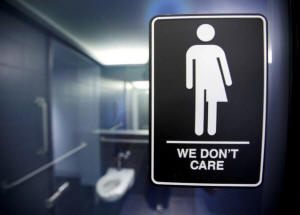|
Supreme Court takes up major transgender
rights case
 Send a link to a friend
Send a link to a friend
 [October 29, 2016]
By Lawrence Hurley [October 29, 2016]
By Lawrence Hurley
WASHINGTON (Reuters) - The U.S. Supreme
Court on Friday agreed for the first time to rule on transgender rights
in a case in which a Virginia public school district is fighting to
prevent a female-born transgender high school student from using the
boys' bathroom.
The justices agreed to hear the Gloucester County School Board's appeal
of a lower court's April 19 ruling that transgender students are
protected under U.S. laws barring sex-based discrimination. The case
involves a 17-year-old transgender student named Gavin Grimm, who
identifies as male and sued in 2015 to win the right to use the school's
boys' bathroom.
The case, to be argued and decided before the end of June, will be one
of the biggest of the court's term.
"I never thought that my restroom use would ever turn into any kind of
national debate. The only thing I ever asked for was the right to be
treated like everyone else," Grimm said in a statement.
The court's decision to take the case means Grimm will not be able to
use the boys' bathroom before graduating from high school next year,
said Josh Block, his lawyer at the American Civil Liberties Union.
"These sorts of discriminatory policies stigmatize and isolate
transgender students like Gavin just because of who they are," Block
added.

'BODILY PRIVACY'
The school board's chairman, Troy Anderson, welcomed the court's
decision to hear the case, saying the board's policy "carefully balances
the interests of all students and parents."
Conservative groups have backed the school board, saying the fight is
about student privacy rights.
"In light of the right to bodily privacy, federal law should not be
twisted to require that a male be given access to the girls' facilities,
or a female to the boys' facilities," said Gary McCaleb, a lawyer with
the Alliance Defending Freedom, a conservative Christian legal group.
At the heart of the case is the question of whether transgender people
are covered by a ban on gender discrimination in education under federal
law.
President Barack Obama's administration concluded that they are, but
there is a legal fight over whether judges are required to defer to the
government's view. The justices could side-step a major ruling by
focusing their decision on whether the administration followed the
correct procedure when it gave public notice about that legal
conclusion.
The court remains one justice short following the February death of
Antonin Scalia, which left it with four conservatives and four liberals.
That raises the possibility of a 4-4 ruling that would leave in place
the decision favoring Grimm by the Richmond-based 4th U.S. Circuit Court
of Appeals. A 4-4 ruling would set no nationwide legal precedent.
The court until now had generally steered clear of taking potentially
divisive cases while it remained shorthanded.
The Supreme Court has not directly ruled on transgender rights before.
But in 1994 the court did rule in favor of a male-born transgender
prison inmate identifying as a woman who was held with male prisoners
and said she was beaten and raped by another inmate.
[to top of second column] |

A sign protesting a recent North Carolina law restricting
transgender bathroom access is seen in the bathroom stalls at the
21C Museum Hotel in Durham, North Carolina May 3, 2016.
REUTERS/Jonathan Drake/File photo

Whether to allow transgender people to use public bathrooms that
correspond to their gender identity rather than their birth gender
has become the latest flashpoint in the long U.S. battle over
lesbian, gay, bisexual and transgender rights. In a major gay rights
ruling in 2015, the Supreme Court legalized same-sex marriage
nationwide.
The transgender fight heated up after North Carolina passed a
Republican-backed law in March that required people to use bathrooms
that corresponded to their gender at birth in government buildings
and public schools. The North Carolina law, being challenged in
court, also blocked local measures protecting lesbian, gay, bisexual
and transgender people from discrimination.
The Obama administration in May issued nationwide guidance telling
public schools that transgender students should be allowed to use
the bathroom of their choice.
That guidance infuriated many conservatives and prompted a
Republican-led legal effort to fight it. Twenty-three states sued to
block the guidance. A U.S. district court judge on Aug. 22 issued a
nationwide injunction sought by Texas and other states preventing
the administration from enforcing the guidance.
In the Virginia case, the Supreme Court in July voted 5-3 to
temporarily block the appeals court decision from going into effect
while the litigation continued, a move that prevented Grimm from
using the boys' bathroom when the new school year began in
September.
Grimm began attending school as a boy in September 2014. With the
school's permission, Grimm used the boys' bathroom for about seven
weeks without incident. But after complaints from parents, the
county school board adopted a new policy in December 2014 that
required students to use the bathroom that corresponded with their
gender at birth.

Since then, Grimm has had to use a separate bathroom.
As a result of hormone therapy, Grimm has facial hair and a deep
voice. Grimm has also had chest reconstruction surgery but not sex
reassignment surgery.
(Reporting by Lawrence Hurley; Editing by Will Dunham)
[© 2016 Thomson Reuters. All rights
reserved.]
Copyright 2016 Reuters. All rights reserved. This material may not be published,
broadcast, rewritten or redistributed. |